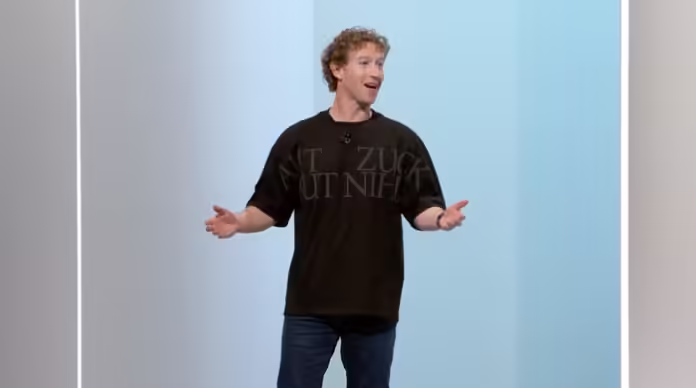Mark Zuckerberg’s keynote address at Meta’s Connect event in September was accompanied by the phrase “Aut Zuck Aut Nihil” which adorned the front of his loose-fitting black shirt.
In all-caps and grey font, the words were a spin on the Latin phrase “Aut Caesar Aut Nihil,” which translates to “Either Caesar or nothing” or “All or nothing.” It was an appropriate phrase for a corporation that in 2024 dedicated its entire resources to its artificial intelligence strategy.
Meta announced in April that it would increase its expenditure by up to $10 billion in 2024 to fund infrastructure investments for its AI initiatives. Despite the fact that the announcement caused shares to plummet by as much as 19% that evening, investors have since come to appreciate the company’s costly AI ambitions. Meta’s stock price achieved a record high on December 11, and it has increased by nearly 70% year-to-date as of the market’s close on Friday.
Zuckerberg stated during a call with analysts in October, “It is evident that there are numerous new opportunities to leverage new AI advancements to accelerate our core business, which is expected to generate a substantial return on investment over the next few years. Consequently, I believe we should allocate additional resources to this area.”
He acknowledged the “positive impact of AI on nearly all aspects of our work,” emphasising that the technology was instrumental in the company’s online advertising business’s recovery from the blow it received from Apple’s iOS privacy update in 2021. Zuckerberg also stated that AI is the foundation of Meta’s more recent initiatives, including the experimental Orion augmented reality headgear and Ray-Ban Meta smart eyewear, which he believes could be the “next computing platform.”
The technology has become Meta’s top priority, as evidenced by Zuckerberg’s comments about AI. This has a direct influence on the company’s business and has the potential to create future revenue opportunities. In contrast to the company’s more conventional services, such as Instagram and Facebook, Zuckerberg is interested in integrating AI, an infrastructure technology, into its different products. This is especially important as competitors like OpenAI continue to gain traction with consumers.
Meta’s Llama AI models are the foundation of the company’s most recent generative AI features, such as the Meta AI digital assistant, while OpenAI’s GPT family of AI models aid in the operation of applications such as ChatGPT. Zuckerberg’s primary method of introducing generative AI technologies to its billions of users is that chatbot.
Zuckerberg stated at Connect that Meta AI is on course to become the most widely used AI assistant in the world by the end of the year.
The organisation has been steadily introducing new generative AI features to advertisers in order to enhance the efficacy of its online advertising platform. Meta intends to establish a more enterprise-oriented unit in the upcoming year following the recent appointment of Clara Shih, who previously served as Salesforce’s CEO of AI, to manage a new business AI group.
Meta’s comprehensive AI strategy has prompted analysts to anticipate that the company will achieve greater success in 2025.
Meta was selected by Jefferies analysts as one of the “winners” of generative AI in the upcoming year of 2025. In a note dated December 15, the analysts stated that the company’s extensive user base is “one of the richest surfaces to introduce Gen AI tools.” In a recent note, analysts from Truist Securities stated that the Meta AI digital assistant has the potential to challenge Google’s search engine as “an answer engine for all kinds of queries.” They also predicted that the social media company is likely to outperform in 2025, potentially benefiting from the provision of more advanced customer service chatbots to businesses.
The Jefferies analysts wrote, “We are of the opinion that META has a distinctive opportunity to introduce Gen AI tools to the nearly 4 billion users and over 200 million businesses across its family of apps.”
Meta declined to provide a comment for this article; however, they referenced previous statistics and executive statements regarding AI.




